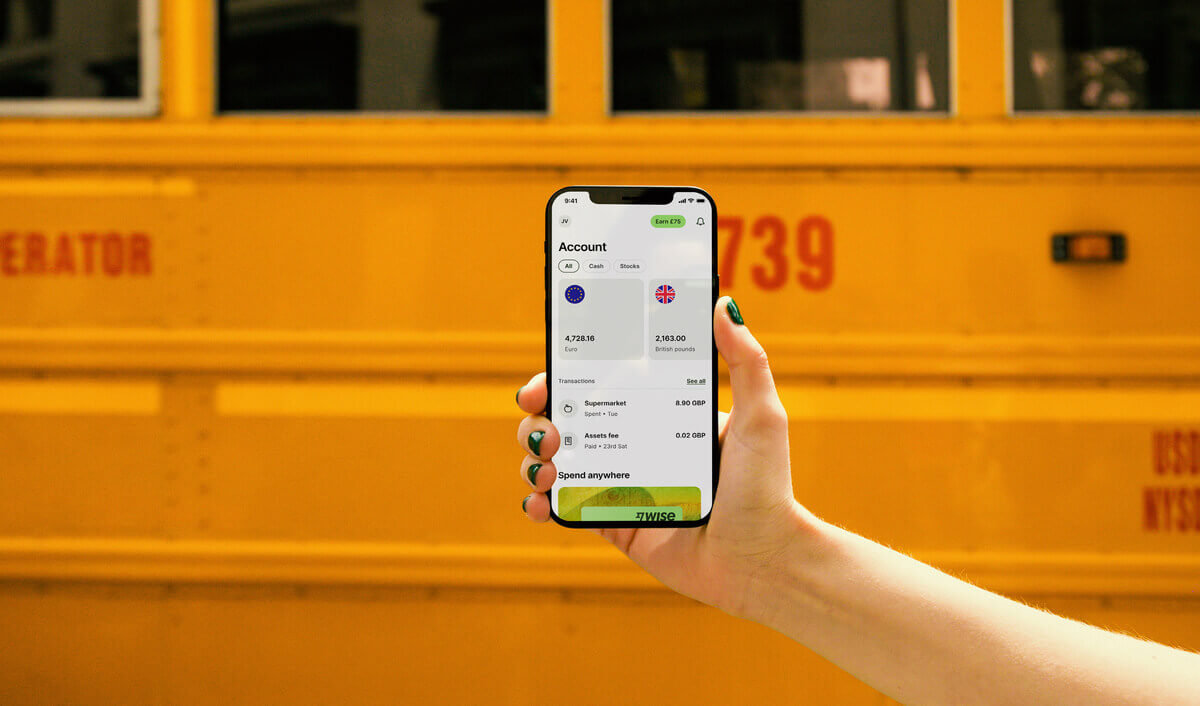Open bank account in Portugal for South Africans
Discover how you can open a bank account in Portugal as a South African, including information about what you need, the best Portuguese banks and more!

Whether it’s the chance to get an additional 30% of your salary tax-free as relocation compensation,⁵ or the fact that only 0.3% of employees in the country work long hours in paid work,⁶ there are several reasons so many South Africans are choosing to move to the Netherlands for work.
If you’re thinking about joining the Dutch workforce and taking advantage of one of the best work-life balances in the whole of Europe, this article will cover everything you need to know about working in the Netherlands as a South African.
We’ll also briefly introduce Wise*, an international money transfer services provider specialising in international money transfers that can help you save money if you’re sending some of your salary back home.⁴
*Wise Europe is not a bank. Wise Europe is an authorised Payment Institution incorporated as an SA in Belgium, supervised by the National Bank of Belgium.
South Africans who want to work in the Netherlands need a work visa to become legal employees in the country.
There are two main types of work visas: a TWV work visa and a GVVA work visa, also called a single permit. The latter is a combination of both a residence and a work permit.⁶
If you want to work in the Netherlands as a South African, you’ll either need a TWV work visa or a GVVA work visa. Which of the two permits you apply for depends on how long you want to work in the country.
If you want to join the Dutch workforce for less than 90 days, you’ll likely need a TWV work visa. Note that only your employer can apply for a TWV permit on your behalf.⁸
For those thinking about working in the Netherlands for more than 90 days, you’ll likely need a GVVA work permit instead. Foreign citizens can apply for a GVVA work visa themselves.⁸
If you’re self-employed, you’ll need to obtain a residence permit for self-employed persons to work legally in the Netherlands.
South African nationals who want to start up a business in the country also need to apply for a residence permit to begin a startup.⁸ We’ll explain this process later on in the article.
While many foreign workers typically focus their job search in big Dutch cities like Amsterdam and Rotterdam, there are also several job vacancies in places like Utrecht, Maastricht, and Groningen.
The following online portals list vacancies in the Netherlands:
Below is a table of median annual salaries for a variety of different jobs in the Netherlands.¹⁸
| Position | Median Annual Salary |
|---|---|
| Marketing Director | 150,100 EUR (3,049,228 ZAR) |
| Service Engineer | 61,600 EUR (1,251,341 ZAR) |
| Marketing Assistant | 45,400 EUR (922,255 ZAR) |
| Receptionist | 28,900 EUR (587,048 ZAR) |
| Customer Service Team Leader | 51,700 EUR (1,050,267 ZAR) |
| Data Analyst | 61,200 EUR (1,243,256 ZAR) |
| IT Project Leader | 89,100 EUR (1,810,146 ZAR) |
For South Africans moving to the Netherlands for work, Wise is a money service provider that can help you save money¹ when making international payments to South Africa. This is a good option if you’re considering sending some of your salary back home.
Even though most Dutch banks support international payments, it’s typical that banks may add a markup on top of the mid-market exchange rate to process these transactions. It’s the customer’s responsibility to pay this additional fee.
At Wise, however, customers don’t need to pay this markup fee. This is because Wise uses the mid-market rate for international transactions. The only thing customers have to pay to make an overseas payment is a small transparent fee.¹
As a result, South Africans working in the Netherlands can save money¹ when making overseas payments from the Netherlands to South Africa.
The easiest way to apply for a work visa in the Netherlands is to have your employer apply on your behalf. They must submit the application in writing by post.¹⁹
You can also apply for a work visa by visiting the Netherlands embassy in Pretoria or the consulate-general in Cape Town. This is the best method for those who are self-employed or looking to start a business in the Netherlands.
The IND (Dutch Immigration and Naturalisation Service), will decide on your application within 90 days.²⁰ If your application is incomplete when you submit it, this decision period will be extended. In this case, you will receive a message from the IND.
Can I work in the Netherlands without specifically obtaining a work visa, is one of the most common questions asked by South Africans looking to work in the country.
Since South Africa is outside the EEA and Switzerland, South Africans will need to apply for one type of work visa to work in the Netherlands.²¹
However, if you wish to work in the country for less than three months, you only need to apply for the TWV permit which doesn’t include a residency visa.
The total cost of a work visa for South Africans joining the Dutch workforce varies depending on which permit they’re applying for.²²
| Permit type | Cost in EUR | Cost in ZAR |
|---|---|---|
| GVVA Permit | 380 | 7,719 |
| Residence permit for self-employed persons | 380 | 7,719 |
| Residence permit for those looking to establish a start-up | 380 | 7,719 |
| Orientation year (looking for a job after studies) | 228 | 4,627 |
There is more information about work visas for those looking for a job after studying in the Netherlands in the rest of the article.
When applying for a work visa in the Netherlands, South African nationals need to supply the following:
For South Africans who have already found work before coming to the Netherlands, their employer will function as their sponsor. A sponsor is responsible for ensuring an employee meets all the requirements for a residence permit and will apply for this permit on their behalf.²³
When deciding whether to grant a permit, the IND will distinguish between non-recognised sponsors and recognised sponsors. If your sponsor is recognised by the IND, your application will be processed a lot quicker.
The documents required when applying for a work visa in the Netherlands vary depending on the permit. However, South African nationals will need to supply the following for all visa types:²⁴
Several Dutch universities actively promote student exchanges. This makes studying in the Netherlands a popular choice for South Africans looking to study abroad. However, since the cost of living in the Netherlands is generally quite high, many students often consider getting part-time jobs to fund their studies on the side.
South African nationals studying in the country can legally work up to a maximum of 16 hours per week alongside their studies.²⁶
They will need to obtain a work permit to do this, however, the procedure is fairly uncomplicated; it’s the employer’s responsibility to apply for the permit on behalf of the student, and the application doesn’t require proof that the position could have been filled by a Dutch or EEA citizen.
The application procedure will take approximately five weeks, so the student mustn’t begin working until the permit has been issued.
Students can legally work full-time in the Netherlands in June, July, and August. During the other months of the year, they are only able to obtain part-time contracts.²⁶
Many students who go to the Netherlands for their studies, including those from South Africa, enjoy their time in the country so much they wish to continue living there after their studies are complete.
For international students who want to stay longer in the Netherlands, the Dutch government offers a specific visa type called an ‘Orientation Year’ residency permit.²⁷
The ‘Orientation Year’ residency permit is eligible for non-EEA students who have completed a university course or research project in the country in the past 3 years. This permit gives graduates free access to the Dutch labour market and is valid for one year.
Since employers won’t need to apply for a work permit on your behalf or adhere to a salary criterion like with other international workers who haven’t already been living in the Netherlands, it can be easier to secure employment with this type of work permit.
However, if you aren’t able to find a job during this year, there will be no consequences to your visa either. You can also use this residence permit to do an internship in the country.
To be eligible for an ‘Orientation Year’ residency permit, you need to have completed a bachelor’s or master’s programme at a Dutch university. Students who have obtained a master’s degree in the context of an Erasmus programme are also eligible for this permit.
Being able to bring your partner or family members is an important part of relocating to the Netherlands to work. While it’s possible to bring your loved ones over, they’ll also need to apply for a residence permit to legally move into the country with you.
To bring a partner or family member with you to the Netherlands, they need to apply for an MVV entry visa to enter the country.²⁸ This permit enables them to stay in the Netherlands for more than 90 days.
Note that your partner or family member’s application will be processed more quickly if your employer submits their application at the same time as yours.
If your partner hasn’t had a Dutch residence permit before, they’ll need to apply for an MVV entry visa, also called a provisional residence permit.
To apply for an MVV, your partner will need to meet the following requirements:²⁹
For your partner to be eligible for this permit, you will also need to meet the following requirements as their significant other:
Your partner can apply for an MVV entry visa at the Dutch embassy in Pretoria or the consulate-general in Cape Town. The fee for an application is 228 EUR (4632 ZAR).
South African nationals who want to work in the Netherlands on a self-employed basis will need to obtain a residence permit to work legally in the country.³³ Their business must also be proven to serve an essential Dutch interest.
To assess if your business is an essential interest to the Dutch economy, the RVO (the Netherlands Enterprise Agency) will assess your work as a self-employed individual in the following three areas:³³
South African self-employed professionals must also meet the following requirements to obtain a residence permit to work on a self-employed basis in the Netherlands:³³
If you’re thinking about moving from South Africa to the Netherlands to start your own business, you’ll need to apply for a residence permit for start-ups in the country.
To obtain a residence permit to start a business in the Netherlands, South African professionals need to meet the following specific requirements:³⁵
Moving from South Africa to the Netherlands for work requires a lot of paperwork. However, there are also several things you need to arrange immediately after you arrive in the country.³⁷
Within 5 days of arriving in the Netherlands, South African professionals must register with the Dutch municipality where they’ll be living. If you have moved to the country with your partner and family members, they also must accompany you to the appointment. Failure to register in time may result in a fine.
Many professionals choose to relocate for work without finding a permanent living address. In this case, you can ask the municipality if you can register temporarily with a correspondence address; even though you might not live at this address currently, the government will still be able to contact you.
DigiD is a means of identification in the Netherlands. You can use DigiD to identify yourself to securely access services online that you might need during relocation. After you have registered in the Personal Records Database (BRP), you can apply for a DigiD.
Once you have applied for a DigiD, you can log in to MijnOverheid. MijnOverheid is a system containing all the information that’s registered with the Dutch authorities. The ‘Berichtenbox’ Message Box feature of MijnOverheid is where you can find important messages from relevant Dutch authorities, for example, messages from the Tax Administration and notices from your municipality.
Everyone who lives in the Netherlands legally needs to take out health insurance to cover basic healthcare costs.³⁸ It’s worth noting that many insurance packages might not cover care that expats would expect; for example, local anaesthetic incurs an additional cost.
Dutch employers will typically pay a small percentage towards these costs, which can make it cheaper overall.
If you’re thinking about relocating to the Netherlands from South Africa for work, it’s important to weigh up the pros and cons. We’ve listed several advantages and disadvantages regarding this move for both yourself and any family members you bring with you.
| Pros | Cons |
|---|---|
| The Netherlands has one of the best work-life balances in the whole of Europe.⁶ | Many companies require Dutch language skills as well as English, particularly jobs in the healthcare, government and education fields. |
| There are great professional incentives for expats, like the 30% tax facility for foreign workers⁵. | It’s compulsory to take out healthcare insurance in the Netherlands which can be expensive if your employer doesn’t pay towards these costs. |
| There are several work visas professionals can apply for, including a TWV work visa, a GVVA work visa, and an ‘Orientation Year’ residency permit for graduates. | Living in the country can be expensive, particularly in big cities where rent and transport costs are especially lifted. |
Moving from South Africa to the Netherlands is a great opportunity for professionals looking to take advantage of a great work-life balance and have the rest of Europe on their professional doorstep.
If you’re thinking about making the move, make sure to properly research the application process for a relevant work permit in the country, and how to open a Dutch bank account as a South African expat to start receiving your salary immediately.

When it comes to managing money, Wise is a great international money transfer services provider for international⁴ payments to South Africa.
*Please see terms of use and product availability for your region or visit Wise fees and pricing for the most up to date pricing and fee information.
This publication is provided for general information purposes and does not constitute legal, tax or other professional advice from Wise Payments Limited or its subsidiaries and its affiliates, and it is not intended as a substitute for obtaining advice from a financial advisor or any other professional.
We make no representations, warranties or guarantees, whether expressed or implied, that the content in the publication is accurate, complete or up to date.

Discover how you can open a bank account in Portugal as a South African, including information about what you need, the best Portuguese banks and more!

Considering moving to Ireland to work? Here’s what South African professionals need to know about work visas, the Irish job market, and the application process.

A complete breakdown of everything needed to open an account in France as a South African.

Discover how to open a bank account in Ireland as a South African, including info about the documentation you need, the best Irish banks and more!

Everything you need to know about setting up your bank in the USA as you move from South Africa.

The ultimate guide to moving to Canada for work, including how to find a job in the country, different work permits and visa types, and the cost of applying.